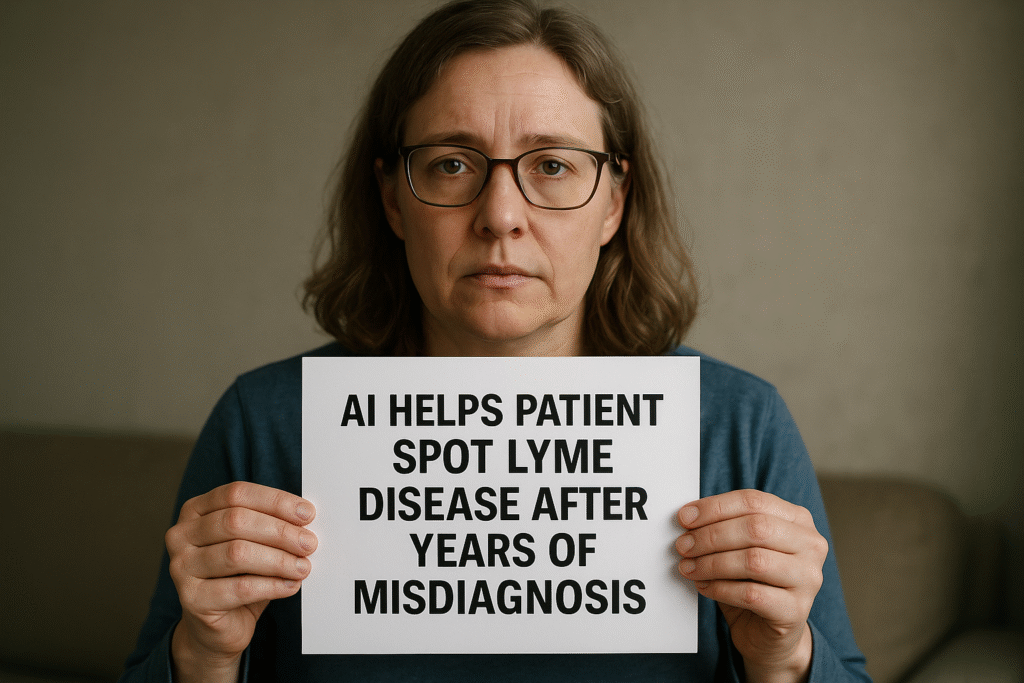By Harshit | 13 October 2025 | Hampshire | 9:00 AM BST
AI-Assisted Diagnosis Brings Relief After Years of Misunderstanding
For Oliver Moazzezi, the journey to a proper diagnosis of Lyme disease was long, frustrating, and physically debilitating. What started with ringing in his ears (tinnitus) evolved over several years to include high blood pressure, extreme fatigue, and muscle spasms. Despite repeated consultations with doctors, including an Ear, Nose, and Throat specialist, Oliver found himself dismissed, with some attributing his symptoms to anxiety.
Unable to find answers through conventional healthcare channels, Oliver turned to artificial intelligence (AI) for insight. “I felt quite vindicated… if I hadn’t persisted, if I hadn’t put all of my symptoms into AI, I would hate to think where I would have been left by healthcare professionals,” he said.
Symptoms and Early Struggles
Oliver’s ordeal began three years ago when he was bitten by a tick brought home by his cat from nearby woods in Whiteley. Over time, his tinnitus worsened to the point where he could no longer hear the rustling of leaves or bird songs, making outdoor walks unbearable. Previously active—regularly going to the gym and swimming—he found his energy levels severely diminished, impacting his daily life.
“All I had was this massive high-pitched scream… it was horrific and it was day and night for weeks and months,” Oliver described.
AI Intervention
Frustrated by the lack of answers, Oliver, an IT consultant familiar with AI, decided to input all his symptoms, including the tick bite, into an AI system trained on verified medical sources. “I told it to look at verified medical sources… and I’ve not told it Lyme disease—it’s telling me,” he said.
Following the AI’s suggestion, he consulted a private doctor, requesting an antibody test, which came back positive for Lyme disease. The result validated his suspicion and highlighted the potential of AI as a tool for patients navigating complex medical scenarios.
Expert Warnings and Guidance
Despite Oliver’s success, medical professionals emphasize that AI should not replace qualified clinicians. Lyme disease is systemic and difficult to diagnose, often showing symptoms similar to other conditions. Early detection is crucial for effective treatment, and AI can help identify potential warning signs, but human oversight remains essential.
“While AI can support patients in understanding symptoms, anyone concerned about their health should speak to a trained clinician or contact NHS 111 for guidance,” advised the Hampshire and Isle of Wight Integrated Care Board.
Challenges in Lyme Disease Diagnosis
Specialists, including tick-borne disease clinician Georgia Tuckey, note that Lyme disease remains underdiagnosed. Around 1,500 laboratory-confirmed cases are reported in England and Wales annually, though estimates suggest 3,000 to 4,000 people are treated without confirmation.
Tuckey argues that focusing solely on lab-confirmed cases limits research investment and training, as the true number of patients is likely higher. “We have a particular way of understanding symptom presentation… and that isn’t looked for generally in the context of NHS investigations,” she said.
Balancing AI Use and Caution
Experts are divided on AI’s role in healthcare. Tuckey supports using AI to explore potential Lyme disease symptoms, especially when traditional avenues fail. Conversely, Professor Ella Haig, an AI specialist at Portsmouth University, cautions that results should always be verified by healthcare professionals. “We can control how much detail we input and restrict sources to official providers, but would we really trust what AI gives us without a clinician? Personally, I would not,” she said.
Relief and Reflection
Following treatment, Oliver reports significant improvements, including a reduction in tinnitus, allowing him to enjoy natural sounds once more. Yet he remains critical of the healthcare system’s handling of his case.
“I feel sorry for anyone else who goes through tinnitus or other symptoms because of Lyme. I feel for them because of the quality you get in the support,” he said.
The Hampshire and Isle of Wight Integrated Care Board reiterated that while AI can support clinicians, it should complement—not replace—professional medical evaluation.







